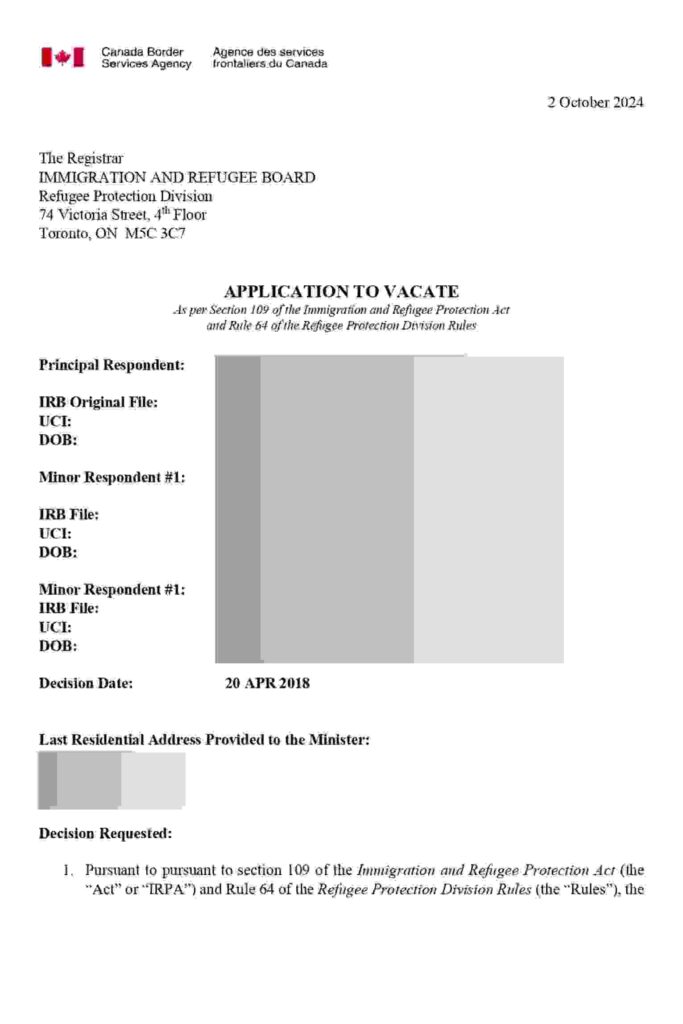Case Study: Loss of Permanent Residency Due to Misrepresentation
At Arnika Visa, we often encounter cases highlighting the critical importance of honesty and transparency in immigration applications. This is the story of an Eritrean family who, after building a life in Canada, faced the harsh reality of losing their permanent residency due to misrepresentation in Canada.
Background of the Case
The principal applicant and her family, originally citizens of Eritrea, moved to the Netherlands and acquired Dutch citizenship. While living in the Netherlands, the family had two children who were also granted Dutch citizenship.
In 2016, the family decided to migrate to Canada, entering the country on their Dutch passports, which allowed visa-free travel. Shortly after arrival, they claimed refugee status, alleging persecution in Eritrea. To support their asylum claim, they presented Eritrean passports and provided detailed testimonies of persecution and torture. Their claims were accepted in 2018, granting them permanent residency in Canada.
The family thrived in Canada, with the principal applicant having three more children born in Canada. However, their past decisions would come back to challenge the life they had built.
Discovery of Misrepresentation in Canada
In October 2024, the family received a notice from IRCC outlining an Application to Vacate their refugee status and permanent residency. IRCC discovered that the family had withheld critical information during their refugee claim:
- They were Dutch citizens at the time of their arrival in Canada.
- They had left the Netherlands voluntarily and used fraudulent Eritrean documents to claim asylum.
Through a fingerprint match with the Dutch Immigration and Naturalization Service, IRCC confirmed that the family had Dutch citizenship since 2015 and had no credible fear of persecution in Eritrea. The evidence provided a clear case of misrepresentation in Canada.
CBSA Application To Vacate Letter

Consequences of Misrepresentation Canada
IRCC’s notice stated that the family’s refugee status was obtained fraudulently, nullifying their permanent residency. Despite building a life in Canada with Canadian-born children, their misrepresentation in Canada disqualified them from maintaining their protected person status.
No Legal Options to Fight the Decision
Unfortunately, despite the family’s strong ties to Canada, the law leaves little room for exceptions in cases of proven misrepresentation in Canada. As misrepresentation Canada undermines the integrity of the Canadian immigration system, the family was ordered to leave Canada.
1.Misrepresentation In Canada Has Long-Term Consequences
Misrepresentation in Canada, whether direct or indirect, significantly damages an applicant’s credibility. It leads to severe legal consequences, including removal orders and bans from re-entry.
2. Humanitarian Factors May Not Always Offset Misrepresentation
Even compelling personal circumstances, such as family ties or community contributions, H&C consideration may not outweigh the seriousness of misrepresentation Canada.
3. Public Confidence in Immigration Laws Is Paramount
Upholding the integrity of Canada’s immigration system often takes precedence over individual cases, especially when deception is involved.
Conclusion: A Difficult Lesson
This case serves as a stark reminder of the importance of transparency in immigration processes. While the family’s story reflects the emotional and logistical challenges of uprooting a life, it also underscores the severe consequences of misrepresentation in Canada.
At Arnika Visa, we strive to help clients navigate their immigration journeys ethically and successfully. If you or someone you know is facing immigration challenges, let us guide you through the process with integrity and expertise.
How Can We Help You With Your Immigration Application?
At Arnika Visa, if you want to apply for a Visa Canada, we can assist you from filing the immigration forms to guiding you through supporting documents; we take care of it all. We can advise you professionally regarding the required personalized supporting documents to increase the chance of your TRV approval and, finally, submit your TRV application to IRCC on your behalf as an authorized representative.
These days, the TRV applications are more than just filling out the forms and showing enough funds to cover your expenses. Accordingly, preparing a solid application from the beginning will place a step forward and strong precedent even to prevent an application from being judicially reviewed (JR).
The IRCC officers know when the applications are well-prepared, which means they would follow through all the stages, including Judicial Review (JR) at the Federal Court, so they would think twice before making a Canada Visa refusal decision. It has been widespread that ghost consultants file TRV applications, although it is illegal since they have no license to do so. By doing so, you miss the second chance to be accepted at the Federal Court level, as the TRV application wasn’t prepared in a way to address all legal IRCC officers’ concerns. Thus, Arnika Visa recommends seeking legal guidance from an Expert RCIC to have a better chance of successful TRV applications.



